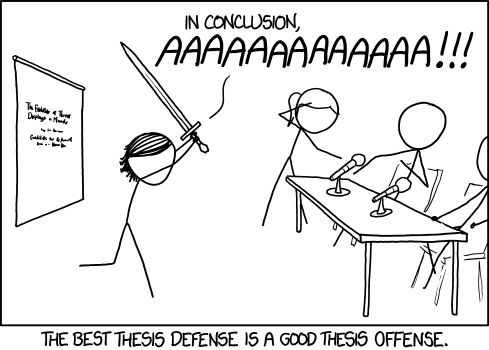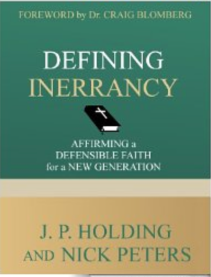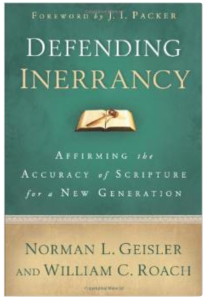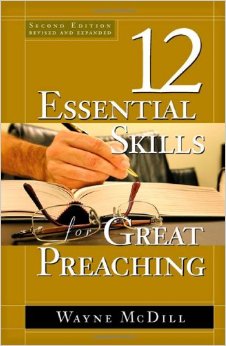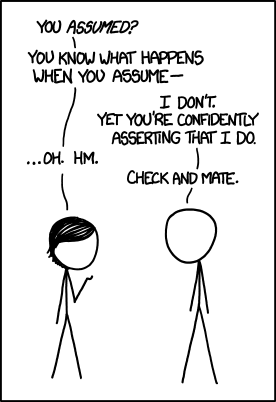Acfyouth
Shared posts
Is Inerrancy a Game Only Played by American Evangelicals?
We Are All Vulnerable to This Toxic Drug
Robert P. George, in his Advice to Young Scholars:
Although it is natural and, in itself, good to desire and even seek affirmation, do not fall in love with applause. It is a drug. When you get some of it, you crave more. It can easily deflect you from your mission and vocation. In the end, what matters is not winning approval or gaining celebrity. Your mission and vocation is to seek the truth and to speak the truth as God gives you to grasp it.
There is a particular danger for those who dissent from the reigning orthodoxies of a prevailing intellectual culture. You may be tempted to suppose that your willingness to defy the career-making (and potential career-breaking) mandarins of elite opinion immunizes you from addiction to affirmation and applause and guarantees your personal authenticity and intellectual integrity. It doesn’t. We are all vulnerable to the drug. The vulnerability never completely disappears. And the drug is toxic to the activity of thinking (and thus to the cause of truth-seeking).
Similarly, D. A. Carson warns that Christian conservatives are not immune to the drug of approval and applause:
[S]eductive applause may come [from] the conservative constituency of your friends, a narrower peer group but one that, for some people, is equally ensnaring. Scholarship is then for sale: you constantly work on things to bolster the self-identity of your group, to show they are right, to answer all who disagree with them. Some scholars who are very indignant with colleagues who, in their estimation, are far too attracted by the applause of unbelieving academic peers, remain blissfully unaware of how much they have become addicted to the applause of conservative bastions that egg them on.
Weekend A La Carte (July 12)
We arrived safely to our quiet spot in South Carolina, after a very long and scenic drive that took us through ON → NY → PA → WV → VA → TN → NC → SC. And here we are. Again, it will be light blogging for the next week as I focus on unwinding. (But I can’t not write at least a bit since it is the most relaxing part of my life.)
A shout-out goes to the folk at Bristol Caverns in Bristol, TN. We dropped by to take a tour of the caverns and met our tour guide Doug who turned out to be a reader of this site. The caverns are well worth the hour-long tour.
This Is Mindy - This is a hard-to-read article from former porn producer Donny. He describes how he recruited a girl named Mindy and then destroyed her life. The point of the article: there is a terrible hidden cost to pornography.
The Vanishing Screwball - Baseball lovers may enjoy this longform article from the New York Times on the screwball and why almost nobody throws it anymore.
The Unexpected Answers of God - Jon Bloom explains that we are often unprepared for the kind of answers we receive from God. And I think he’s absolutely right.
Foods that Taste Bad - Ever wondered why that glass or orange juice tastes unbearable after brushing your teeth? This article explains.
Theology, the Last Resort - Here is some thought-provoking stuff from J.D. Payne.
The Vatican’s Bank - Did you know the Vatican has a bank? Neither did it. Foreign Policy says that its history “reads more like Dan Brown than the financial pages.”
When you go through a trial, the sovereignty of God is the pillow upon which you lay your head. —C.H. Spurgeon\


Review of Defining Inerrancy
Defining Inerrancy: Affirming a Defensible Faith for a New Generation, by J. P. Holding and Nick Peters, published by Tekton E-Bricks on 22 May 2014, is intended to be a response to Norm Geisler and Bill Roach’s Defending Inerrancy—and so much more. Both have a similar cover and similar title. Defining Inerrancy, however, is a gloves-off defense and affirmation of a version of inerrancy that many are not acquainted with. That is, many except those who are Old and New Testament scholars.
Defining Inerrancy also interacts heavily with Norm Geisler and David Farnell’s The Jesus Quest, a book published just last March. The info on Amazon says that the eBook is the equivalent of 98 pages long, based on the number of “page turns” on a Kindle. A preliminary Word draft of Defining Inerrancy, sent to me by the authors, weighs in at just 74 pages. It’s a one-evening read, but it will be an evening very well spent.
Even though only an eBook so far, this little volume addresses some of the most pressing issues within American evangelical circles that have been brewing for more than four decades. And it comes with a Foreword by world-renown Gospels scholar, Craig Blomberg, giving the book instant credibility.
The booklet has fifteen short chapters and no footnotes or endnotes (but some, though not entirely adequate, in-text notes).
Blomberg’s Foreword, in the opening paragraph, lets the readers know that Norm Geisler has recently been attacking his evangelical orthodoxy. As one reads through this book, they will discover that it is in many ways a response to Geisler’s campaign to rid the church of what he perceives to be bibliological heretics. Inter alia, Blomberg gives a laundry list of evangelical scholars who have been the victims of Geisler’s acidic pen: Robert Gundry, Murray Harris, Clark Pinnock, John Sanders, Darrell Bock, Michael Licona, Craig Blomberg—and even the entire Evangelical Theological Society (a group which, according to Blomberg, Geisler referred to as ‘liberal’ and the “Former Evangelical Theological Society”)! And Blomberg does not mince words. Penultimately, Blomberg commends this book as follows: “…if Geisler has already misled you on any of these topics, read these chapters carefully so that the record may be set straight.”
Indeed, that is an apt summary of the book. The authors set the record straight on Geisler’s increasingly marginalized approach to inerrancy. Many would regard Geisler as the spiritual heir of Harold Lindsell, a man whose books The Battle for the Bible and The Bible in the Balance bitterly divided evangelicals nearly four decades ago. But I digress.
The major issue that Holding and Peters put forth is that within the inerrantist camp are ‘traditionalists’ and ‘contextualizers.’ Traditionalists claim that the Bible should be read essentially literally and that unless there are clear in-text clues that something is to be taken otherwise, the reader is to regard the text as literally true. Contextualizers see things differently. They would argue that genre, comparative literature, and other extra-textual features are often important keys to understanding the meaning of the text. The book focuses on the Gospels and narrative. Here, it is claimed, traditionalists view the narrative in the Gospels as historical, while contextualizers view it as imbibing, at times, in more than one genre. And even then, this does not necessarily mean that such is not historical. Even though many traditionalists would claim that, for example, dominical sayings are always exact quotations of the Lord (known as ipsissima verba), contextualizers claim that this is not only not in keeping with ancient historiographical reporting but also involves exegetical gymnastics that defy logic.
The authors put forth their thesis rather boldly:
“inerrancy requires a contextualization of the Bible as both the superlative literature that it is and as a document; and that the ‘as it stands’ readings frequently (not always) decontextualize the Bible, reading it as a text out of time, and therefore without respect to critical defining contexts during the time of its writing.”
And:
“… the perception of ‘inerrancy’ offered by the old guard is dangerous, misleading, and obscurantist in that it will result in a view of the Bible that is not defensible or respectable, leading us down a path of endless epicycles of explanation, artificialities, and illogic. The end result will be to bring down scorn on the Christian faith and contributing [sic] to its demise in the Western world.”
This should be enough to pique the interest of any reader! As astounding as their statements are, I think they are spot on. But one will have to read the book to see whether they make out their case.
I will simply note two refrains that the authors make. First, though the Bible may be inerrant, our interpretation of it is not. This would seem to be obvious, yet repeatedly they show that Geisler sets himself up as the arbiter of truth—including true, inerrant interpretations. And this is one of the great divides among evangelicals today. Ironically, though there are many near-consensus interpretations of a number of passages among evangelicals, to hold up a particular interpretation as the true interpretation is to place tradition above the text. And this cuts directly into sola scriptura—the sufficiency of scripture as our final authority. Geisler and other traditionalists tend to claim that any view that does not see the Gospel narratives as utterly historical is not compatible with inerrancy. Yet—again ironically—many traditionalists claim that the Church has from its beginning embraced inerrancy. But if so, it is certainly not the same inerrancy that is embraced by traditionalists.
A case in point (not mentioned in the book): several church fathers, whose bibliological credentials on the New Testament at least were unimpeachable, claim that Jesus’ healing of the blind man in Mark 8.22–26 was not historical. This is one of two miracles of Jesus recorded in Mark that are not found in either Matthew or Luke. Both of them involved Jesus using spittle (the other is the healing of the deaf-mute in Mark 7). Jerome says that the story is “not historical, but symbolic.” And Ambrose, the bishop of Milan in the fourth century, saw the spittle as a symbol for the washing away of sins in baptism.
Nevertheless, these hoary authorities of old were probably wrong. It is instructive that through the route of historical criticism these two pericopes have become seen as among the most likely historical events in the Gospels—and for the same reasons that Matthew and Luke probably excluded them and the church fathers spiritualized them. Why was that? Embarrassment. Most Gospels scholars today, both evangelical and liberal and everything in between, regard a saying or act preserved in the Gospels that would be potentially embarrassing to the church, as having the marks of authenticity for this very reason, for no evangelist would create such out of whole cloth.
Second, the authors make the case that elevating inerrancy to the level of, say, the resurrection of Jesus, puts one’s whole belief system in jeopardy. Toward the end of the book, they make this case as follows:
“Blomberg also offers us, Geisler says, the hideous (!) statement that if there were a few genuine contradictions in the Bible, the rest of the text would not be jeopardized and the entire case for belief would not be called into question. Yes, this is one of those dangerous views of Scripture that says that if the Bible is not inerrant, then Jesus did not rise. How far would it go? Would we say Jesus did not even exist if we find there are mistakes in the Bible? Actually, there are some professed former Christians who hold to this position, and their questioning of the Bible started with them having been in a position like Geisler’s as confessing Christians.”
This view—making inerrancy as important as the resurrection of Christ—is part of a mindset that does not differentiate among doctrines. I call it the domino view of doctrine. When one falls down, they all fall down. I have taught for years that it is one of the main reasons why some conservatives become “liberal.” I put “liberal” in quotes because often such people are not really liberal; they are still fundamentalists, just on the left side of the theological aisle. They still see things in black and white, but now are skeptical about the supernatural and anything that smacks of biblical authority. Darrell Bock speaks of such a mentality as “brittle fundamentalism.” And he sees it as shattering when it comes in contact with the sophisticated polemics of the left.
In Defining Inerrancy, the authors note that they have known many evangelicals who have abandoned the faith precisely because they started out with such a hardening of the categories. This rings true: I get countless emails from people who have either jettisoned their beliefs (or have friends or family members who have) because their starting presupposition was that it’s inerrancy or nothing. Such people would throw the proverbial baby out with the bathwater! And it is this very problem that one of the architects of modern evangelicalism, Carl Henry (who could hardly be condemned as being soft on inerrancy!), addressed in his book, Evangelicals in Search of Identity. It seems that many evangelicals are still not listening. And yet Henry saw, forty years ago, that the evangelical church was making inerrancy the litmus test of orthodoxy to its discredit. Yet again, I digress. Holding and Peters are not in the least denying inerrancy; they are simply rejecting a rigid form of it that they see as dangerous to the health of the evangelical church.
In sum, Defining Inerrancy is a book far more important than its size would indicate. It defines not only inerrancy but a yawning divide within evangelicalism. My hope is that traditionalists will not dismiss it out of hand (as they have so many treatments coming from contextualizing inerrantists), but will indeed wrestle seriously with its contents. Sadly, I’m not holding my breath.
04/30/14 PHD comic: 'The Word Symposium'
| Piled Higher & Deeper by Jorge Cham |
www.phdcomics.com
|
|
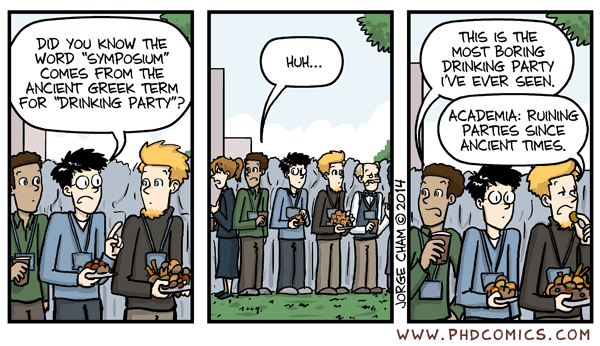 |
||
|
title:
"The Word Symposium" - originally published
4/30/2014
For the latest news in PHD Comics, CLICK HERE! |
||
05/05/14 PHD comic: 'What to call your Academic Event'
| Piled Higher & Deeper by Jorge Cham |
www.phdcomics.com
|
|
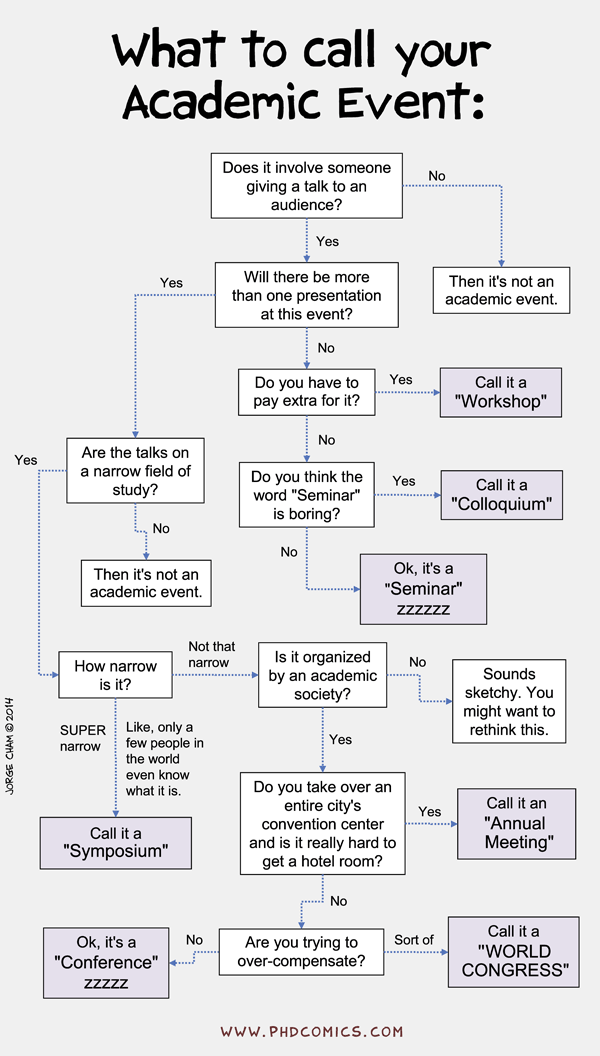 |
||
|
title:
"What to call your Academic Event" - originally published
5/5/2014
For the latest news in PHD Comics, CLICK HERE! |
||
Be More Specific Than “Points” or “Things”
Speakers and writers often say something like this: “My sermon has three points” or “I’d like to share four things.”
This book taught me not to do that:
Wayne McDill. 12 Essential Skills for Great Preaching. 2nd ed. Nashville: Broadman & Holman, 2006.
I took my first homiletics courses in college in the 1999–2000 school year, and the first edition of this book was one of my main textbooks.
That book has served me well over the last fifteen years. It taught me to use language precisely.
Below is one example that has stuck with me. McDill is giving advice about how to craft sermon divisions, but his advice applies to far more than just preaching. It applies to writing and to communication in general:
There are almost an unlimited number of terms you can use as key words [in sermon division statements]. Note that Appendix D provides a comprehensive list of possible key words. But some words should not be used.
- Do not use things as a key word. It is too broad and nebulous to be useful.
- Neither should you use points as a key word for the same reason.
Remember, the key word is simply a device to identify the nature of your sermon divisions as they emerge from the writer’s treatment of his subject. (pp. 111–12, numbering and formatting added)
So instead of saying that the apostle Paul “makes three points,” say, “gives three reasons” or “shows three ways” or whatever. The craft of communicating with speech and writing requires words, so if that’s your craft, you’ll want to develop your ability to use words well.
McDill lists 265 words that communicate more clearly that the ambiguous words “points” and “things” (“Appendix D: Sample Key Words,” pp. 295–96, numbering added):
- abuses
- accusations
- acts
- actions
- actualities
- admonitions
- advantages
- affairs
- affirmations
- agreements
- aims
- alternatives
- assertions
- angles
- answers
- applications
- approaches
- areas
- arguments
- articles
- attitudes
- attributes
- aspects
- aspirations
- assertions
- assumptions
- assurances
- attainments
- attitudes
- attributes
- barriers
- beginnings
- beliefs
- benefits
- burdens
- calls
- causes
- certainties
- challenges
- changes
- charges
- claims
- clues
- commands
- commitments
- comparisons
- compensations
- compromises
- compulsions
- conceptions
- concessions
- conclusions
- conditions
- consequences
- contrasts
- corrections
- credentials
- criteria
- criticisms
- customs
- dangers
- decisions
- declarations
- defenses
- deficiencies
- definitions
- degrees
- demands
- denials
- destinies
- details
- devices
- differences
- distinctions
- directions
- directives
- disciplines
- disclosures
- discoveries
- distinctions
- doctrines
- duties
- elements
- encouragements
- essentials
- estimates
- events
- evidences
- evils
- examples
- exchanges
- exclamations
- exhortations
- expectations
- experiences
- expressions
- facets
- factors
- facts
- failures
- faults
- favors
- fears
- features
- finalities
- forces
- functions
- fundamentals
- gains
- generalizations
- gifts
- goals
- graces
- groups
- guarantees
- habits
- handicaps
- hindrances
- hopes
- hungers
- ideals
- ideas
- illustrations
- imperatives
- implications
- impressions
- improvements
- impulses
- incentives
- incidents
- indictments
- inferences
- injunctions
- insights
- inspirations
- instances
- instruction
- instruments
- intimations
- invitations
- issues
- items
- joys
- judgments
- justifications
- keys
- kinds
- laws
- lessons
- levels
- liabilities
- limits
- lists
- losses
- loyalties
- manifestations
- marks
- means
- measures
- methods
- mistakes
- moments
- motives
- movements
- mysteries
- names
- necessities
- needs
- notions
- objections
- objectives
- observations
- obstacles
- occasions
- offers
- omissions
- opinions
- opportunities
- paradoxes
- particulars
- parts
- peculiarities
- penalties
- perils
- periods
- phases
- phrases
- pledges
- points
- possibilities
- practices
- premises
- prerogatives
- principles
- priorities
- probabilities
- problems
- processes
- promises
- promptings
- pronouncements
- proofs
- prophecies
- propositions
- provisions
- qualifications
- qualities
- questions
- realities
- realizations
- reasons
- reflections
- refusals
- remarks
- remedies
- reminders
- requirements
- reservations
- resources
- responses
- restraints
- results
- revelations
- rewards
- risks
- routes
- rules
- safeguards
- satisfactions
- secrets
- sins
- sources
- specifications
- statements
- steps
- stipulations
- successes
- suggestions
- superlatives
- suppositions
- surprises
- symptoms
- teachings
- tendencies
- testimonies
- tests
- thoughts
- threats
- topics
- totalities
- truths
- undertakings
- urges
- uses
- values
- views
- violations
- virtues
- voices
- warnings
- ways
- weaknesses
- wishes
- words
- wrongs
Related: other posts on preaching and writing
Beware the Dangerous Heresy of Michael Bird!
Leon Morris on Biblical Authority and Inerrancy
Preventing sexual abuse in your home
In my last post I wrote about how worries regarding the potential for sexual abuse can keep people from providing foster care. I provided some background information it’s good to know before providing foster care for a child who may have been sexually abused. I think having a healthy perspective about this issue is very important. I also think it’s vitally important to create a safe environment in your home with the potential for sexual abuse in mind. For us, that has been striking the right balance between openness, honesty, and privacy. Here’s how we do it.
Specific to foster families:
Respect birth order when taking foster kids. I know not everybody is going to agree with me about this and I’m okay with that. God has blessed the ministry of many families who have chosen to take kids out of birth order. I’m not arguing against that if you feel called to that and you have the skills and resources to ensure the safety of all kids in your home. But for our family, respecting birth order has been a big part of how we prevent sexual abuse from happening in our home. We always want our kids to be big enough and old enough to know what is appropriate and be able to say “no” to things they know are wrong. This is a decision we make for the protection of our kids and we don’t let pressure from an agency that wants to place older kids in our home push us into something we aren’t comfortable with. If you feel called to take kids older than your kids, do it with much prayer and with honest conversations about how you’ll protect your kids. If you don’t feel called to take kids older than your kids, don’t be pressured into it and work to recruit foster families who are in a position to take those kids you can’t.
Ask about a foster chid’s history. When you are called about a child who may be placed in your home, you need to ask very specific questions. Don’t feel bad about being nosey. If a caseworker can’t give you that information for whatever reason, they will tell you that. You also need to assume that nobody has the whole story on this child yet. Even if nobody knows about a history of sexual abuse, that doesn’t mean there hasn’t been one. It’s good to have a plan for how to help that child with healthy boundaries and be sure they’re getting the counseling help they require. Because you may not always know the full story, it’s important to have good boundaries in place for your family in general.
Have a safety plan. If you become aware that a child in your home had been abused and sexually acting out, how would you handle it? You need to think through your resources and how you’re going to keep everybody safe. Do other children in the home know what is appropriate and inappropriate? Do you have counseling help available? Do you have a respite provider that can handle children with those issues when you need a break? Are you able to adequately supervise interactions between children? Does every child have privacy in the bathroom and when they get dressed? You need to have answers for these kinds of questions before you take a placement if there’s any potential for issues (which you may or may not know ahead of time).
For every family:
Talk honestly with your kids about their bodies. Bodies are not shameful. The words we use to identify our body parts are not shameful. Use the correct words with your kids from as early a time as possible. Tell them those parts are special and private. There is never too young an age to start having that conversation. There shouldn’t be one special day where you have the birds and bees talk and expect that to cover it. This is an ongoing conversation you have with a child about the beauty and functionality of their body from their infancy through their young adulthood.
Be a person your kids can talk to. Create times for your kids to ask questions that may be on their minds. Let them know that you aren’t embarrassed to talk about sex. Tell them that if they saw something, heard something or had something done to them that they felt uncomfortable about, they need to talk to you about it. Create a climate in your home where a child would feel safe coming to you without fear.
Identify other safe people your kids can talk to. If something happened at school, they can talk to a trusted teacher. Talk about what relatives or family friends or leaders at church would be okay to talk to if they had a question or didn’t feel comfortable coming to Mom and Dad. Ultimately we want them to talk to us, but there may be a reason why that doesn’t feel safe to them or they are in an environment where we aren’t present, so it’s good for them to know there are other people that we trust who could listen to them and help them know how to talk to us.
Tell them what response would be okay if they were inappropriately touched. Have you ever had a fire drill at your home? Have you talked to your kids about the escape routes from your house if there were a fire or about your safety plan if there were a tornado or earthquake? In the same way, you need to talk to your kids about what they should do if somebody tries to touch them inappropriately or asks to see parts of their body that should be kept private. My kids know that they should say “no” and run to Mom or the nearest trusted adult. I’ve also given them my okay to push or kick to get away. That has helped underscore to them how serious this is since we usually emphasize peaceful responses. Even my four year-old knows what parts of her body are private and what to do if someone wanted to see or touch them. I can’t ensure they would do the right thing in that situation, but I have no doubt that they would know what I would expect them to do.
Talk about who can see their body. My kids know that I am allowed to see their body. The doctor is allowed to see their body if I am present (I love that my pediatrician always tells the kids, “This is only okay for me to do because your mom is here.” We may tell our kids that it’s okay for the doctor to see them naked, but fail to think about a person who could claim to be a doctor and prey on that level of trust.). If Grandma is watching them while I’m away or the trusted babysitter is there, there may be a reason they need to see them naked depending on their age (to help them change clothes or bathe them) but outside of those reasons they don’t need to just be naked around those people. Other children do not need to see you naked. Other grown-ups do not need to see you naked. If someone asks, you come tell Mom.
Respect privacy and teach your kids to respect privacy. In our home we draw those privacy lines pretty early. Once a child is about two, I do not allow them in the bathroom with me. We do not allow kids to be in the bathroom together if one of them is bathing or using the toilet, especially kids of different genders. Once kids are out of the toddler years and able to dress themselves, we ask them to get dressed in their own room. I do not have kids in the room with me when I get dressed. (Of course there are exceptions, but these are the guidelines we try to stick to.) In all of these things, we emphasize that those body parts are special and it’s important to keep them private. It isn’t about shame or making them embarrassed, but about saying we don’t show those parts to just anybody. This is also why I do my best to limit who can change my children’s diapers, especially as they get older. I don’t want them to be in the habit of just letting anybody see them naked or touch those parts of their body. I am particularly persnickety about this with our foster kids, which is why I prefer to be called out to change diapers even when my kids are in the church nursery. It is also why I’m a big fan of early potty training.
Be observant. Do your kids seem guilty? Are they sneaking around? Do you feel like they’re hiding something? Is there a friend you don’t trust. You need to listen to your parenting gut. Know what is going on the lives of your kids. Talk to them honestly about the dangers and temptations out there. Not talking about porn won’t keep porn from being on your computer, on your tv, or at the neighbor’s house. We need to equip our kids in age appropriate ways to know how to deal with their own curiosity and help them understand that sexual desire isn’t shameful, although there are wrongs ways to try and get that desire fulfilled. It’s okay to be a little suspicious of your kids and their friends and to be observant about any changing behaviors.
Don’t overreact. Your kids are likely going to come across something you wish they hadn’t seen or heard or experienced. They need to know that isn’t a deal breaker as far as them being people of worth. They likely feel guilty and you need to help channel that guilt into repentance and forgiveness or righteous anger depending on the situation. Don’t jump to conclusions about what kind of people they are because they made a mistake. Don’t let them jump to conclusions either. Remember that if they’re coming to you to confess, you don’t want to discourage that courageous act. If you caught them doing something dumb, remember that they may feel some relief at being caught and need to know you still love them.
In this day and age, choosing not to be a foster family doesn’t protect you from the possibility that sexual abuse can impact the life of your child. We can’t prevent every negative influence or experience. But we can do our best to give our kids the tools to know how to handle these kinds of situations. By talking openly and honestly with our kids we help prepare them and create a safer environment for our children and for children who may enter our home.
Two Differing Points of Departure for Jesus and Memory - Le Donne
Thanks for this Anthony. Let me say a few things about my own paper.My reply:
a) I did not think of my Baltimore as a fortification of my previous paper. "New No Quest" was a new position for me, and what I did in my JSHJ paper was different.
b) I believe that Paul made the point in his response that his paper was *not about* the people he wasn't talking about. It was about Bauckham and Dunn (or whatever). My point here is that it's not fair to criticism people for what they do not argue. I can be faulted in my JSHJ article (and accepted the criticism) that "consensus" was hasty language. Chris objected that people who use memory theory aren't good memory theorists, and on this I'm sure he and Paul and I (and you Anthony) agree. But they are using memory theory, and as such they're fair targets. I say this more about my own work than Paul's, since I don't need to defend Paul.
c) I was asked to talk about how I feel memory theory intersects with HJ studies, and I presented my personal and emerging position. Again, Anthony, you assume that because I don't cite the scholars you name, or actually because I don't agree with them on every point, I haven't read them. I have read them. They didn't alter my growing pessimism about the Quest.
d) For example, I'm pretty sure I referred to "gist" memory in my paper. I don't see evidence that "gist" memory is more reliable than detail memory. Gist memory can be distorted beyond recognition too. So no, "gist memory" does not *necessarily* (or obviously) get us closer to historical material.
e) Neither in my opinion does triangulation, which is really just Multiple Independent Attestation combined with memory theory. It's a provocative idea, and not without its strengths.
I'd like to close with a re-iteration of my Baltimore paper, because it doesn't feel like (from what you wrote here) there I was understood. I said many many times there that what was driving me to the a no quest was NOT the belief that memory is hopelessly unreliable. It's that people are *unable to distinguish* between reliable and unreliable memory. That for me is the kicker. Then in my paper I presented 10 memories of Matthew, each of which he presents exactly like any other, but which some cannot possibly be actual memories of Jesus. Finally, my point was not that memory theory leaves us with nothing to say about Jesus. It's that it leaves us with more to say about his followers than him. I do not think that manufactured memories (of which there are many in Matthew) tell us anything about Jesus. They tell us about how his followers felt about him. That's valuable, but that's not the Quest for the historical Jesus any more. I am well aware some people disagree. That I don't agree with them doesn't mean I haven't read them.
Zeb,
a) I quite appreciated the difference between your two essays.
b) As you say, you cannot speak for Paul.
c) If you have read the scholars that I mention and have simply chosen to neglect them, you've clearly under-appreciated their importance. Moreover, we will continue to disagree about your general representation of the field.
d) Your suggestion of a dichotomy between "gist memory" and "detail memory" and your phrase "closer to historical material" deepens my suspicion that your default tends toward historical positivism. My guess is that this is precisely where our assumptions of what constitutes "historical Jesus" research diverge.
e) Triangulation as I've adapted from Theissen and Winter and (yes, put in conversation with memory distortion patterns) does not get us "closer to historical material." It is valuable not in isolating an authentic core (cf. Multiple Independent Attestation), but in measuring trajectories of evolution from mnemonic pre-event orientations, through memory events (including "false" memory, however rare), to multiple and varying commemorative practices.
Finally, my post above wasn't meant to take you on in a direct way (as opposed to my response to your JSHJ essay). I will say, however, that I don't think that a "No Quest" ever happened outside of Nazi Europe and is simply not possible in historical Jesus studies. One last point, it seems that your entrée into this discussion is focused heavily on a few studies that examine the most extreme possibilities of false memory. Most of the time (and the work of Ebbinghaus et al. should fill out any appeal to Loftus on this point) the qualifier "false" is not a helpful way to refer to memory. False memory does indeed happen. No doubt. Further, memory is only possible in a world of evolving intelligibility. So there is no memory that corresponds to the actual past in a way that engenders certainty. The positive element of this is that the continuity of memory distortion is the rule, not the exception (you wouldn't get this impression from Loftus et al.). And if memory is most often continuously intelligible, and if (a la Schudson) memory distortion moves in typical patterns, the evolution of memory can be charted.
To say "people are *unable to distinguish* between reliable and unreliable memory" (as you do) and allow this notion to be the "kicker" is to become disinterested in a fascinating topic prematurely. I do hope that I was able to convey in my The Historiographical Jesus that there is much and more to be gained after the false dichotomies of historical positivism have been exposed. Any discussion of memory that ends with the realization that memory is distorted is superficial. This is only where the discussion begins for me.My continued hope is that this conversation about Jesus and Memory is just beginning. I also hope that my conversation with Zeb is just beginning.
-anthony
Thate on the Criteria of Authenticity Doubters—Chris Keith
Acfyouthsocial memory
Thate employs the Derridean term of "outbidding" to contextualize our opposition to previous historical Jesus methods (13). I suppose this is true, but I'm not entirely sure what form of critical scholarship that entails disagreement with what-has-gone-before wouldn't qualify as "outbidding."
In a footnote on the same page (13n.86), Thate says regarding "post-criteria historical Jesus research": "Later Keith attempts to mitigate the mounting suspicion one has while reading his chapter by stating that a 'post-criteria quest for the historical Jesus is not a post-critical quest' (p.205). It is not clear to me how this can possibly be the case given his lack of explication of what this might mean and how 'post-criteria' yet still critical engagements functionally differ from the post-critical convictions of say, Kaehler and McKnight." He then proceeds to cite two publications of mine, a ZNW article and my monograph, Jesus' Literacy, but no pages for either.
I have no idea what Thate's "mounting suspicions" might be, but it sure seems that he's insinuating that I'm not being honest when I say that a post-criteria quest is not a post-critical quest. If this is the case, I can only say two things. First, I think it's more professional to stick to someone's argument instead of what one suspects his or her motives to be. Second, I really meant it when I said that a post-criteria quest is still critical, as I have argued both for and against the historicity of aspects of the gospels based on a post-criteria approach, which brings me to my next point.
I'm particularly confused by his statement that I haven't given an explication of what post-criteria Jesus research might look like in light of the fact that he then cites two of my publications wherein I do precisely that. One can argue about whether I am convincing, but I don't think it's up for debate whether I at least have made the effort. Other scholars, at least, have not missed this. For example, I quote Christopher Skinner's review of Jesus' Literacy: "In my estimation, the WHAT of this book is not as important as the HOW. Here’s what I mean: Keith’s research topic (viz., did Jesus hold status as a scribal literate teacher?) is likely not as earth-shattering as some other questions we could ask about the historical Jesus (though I do believe he has demonstrated its importance relative to other questions). Rather, the strength of what Keith has done in this book is that he has provided us with a very good model of how to do responsible Jesus research on a specific issue using a social memory approach. Aside from his conclusions (which I think are plausible), I believe that the employment of his method is the greater contribution of the book." I'll add that Dale Allison's foreword to Jesus' Literacy notes similarly that the book as a whole is an effort to make judgements about the historical Jesus sans criteria of authenticity. Again, I could be completely wrong in my arguments, but I have at least made an effort to show examples of what post-criteria Jesus research could look like.
I suppose the oddest statement for me is on p.17: "Though certainly promising on many counts, the purported 'post-criteria' approach adopted here cannot escape the erotics of 'authenticity' or the gaze of the originary. This is a Quest for the pure genre; the authentic genre; the real genre. As such, this amounts to little more than the criterion of authenticity in drag." Hmmm. Alrighty then. As to the "erotics" and "drag" comments, I think this is a very strange way to sexualize one's interlocutors and I don't really think I have much more to say about that. I am confused further, though, that Thate seems to think we have simply redressed the criteria of authenticity. Speaking for myself, I think that he is discussing a different "authenticity" than I am. I mean it specifically as the New Questers defined it--bits of the past detached from interpretive frameworks. I don't think such a thing ever existed; so I certainly have not tried to redress it or apply it at a generic level, and I note that Thate provides no example where I have called upon a criterion of authenticity and cites no example to demonstrate that any of the contributors "cannot escape the erotics of 'authenticity.'" I guess he means that we're still interested in "authenticity" in some way, but again, for me, I'm dealing with a very specific type of "authenticity" and one that's not possible in my opinion. And to my knowledge, not a single contributor to Demise ever makes any reference at all to an "authentic genre."
I'm sure I'm misunderstanding something here and I'm open to correction. But I can't help the sense that I've been misrepresented, and at least join company with Dale Allison who, as Thate notes on 217n.235, also believes Thate had not understood him.
I should emphasize that I raise these issues mainly out of disappointment in light of the fact that the book shows great promise. I think Thate's book could be very important, and I use the subjunctive there only because I haven't read it all yet. Maybe I've misunderstood his misunderstanding, however, and I'd welcome clarification.
2014.03.02. Kuma, The Centrality of Αιμα (Blood) in the Theology of the Epistle to the Hebrews
Reviewed by James Harrison
Flashcards for Greek and Hebrew: Adding Word Lists
We are pleased to bring you a new app for Android and iOS devices, Flashcards for Greek and Hebrew. This is a new and powerful tool for students of the text. Its flexibility ensures that whether you’re studying for a test or preaching through the book of Ruth, Flashcards for Greek and Hebrew will help you drill precisely the words you need to learn, wherever you go.
Importing word lists
When you sign into Flashcards for Greek and Hebrew with your Logos.com account, it syncs up your word lists documents right to the app. If you have existing word lists, they will be automatically imported. To create and import new word lists, follow these simple steps:
1. Click the Documents menu in Logos on your desktop
2. Select Word List from the column on the left
3. Rename your new Word List at the top of the newly-opened window
4. Click the Add button, and select which resource you’d like to add lemmas from. In this case, we’ll choose BHS
5. In the Reference field, type the reference or range you’d like to pull in lemmas from. We’ll be using the book of Ruth
6. A word list of all the lemmas in the book of Ruth from the BHS has now been generated, and will be available automatically in your Flashcards for Greek and Hebrew app
 There are many other ways to create lists in Logos, and a lot more you can do. We encourage you to explore the Word List feature in Logos, and try merging different lists, creating lists from selected portions of text, and creating lists from a certain highlight style.
There are many other ways to create lists in Logos, and a lot more you can do. We encourage you to explore the Word List feature in Logos, and try merging different lists, creating lists from selected portions of text, and creating lists from a certain highlight style.
No matter how you create them, they are always synced through the cloud right to your Flashcards for Greek and Hebrew app on your mobile device, ensuring that you can study the original languages in whatever way you need.
Original language resources
If your Logos library doesn’t have the original language books and Bibles you’re looking for, don’t miss a few of these key resources:
- The German Bible Society’s Hebrew Bible, Biblia Hebraica Stuttgartensia (BHS)
- Free! The Greek New Testament: SBL Edition
Original language texts are included in Logos 5 Bronze base packages, and up. Consider upgrading or getting a base package to take full advantage of the tools and resources Logos has to offer. Learn more about Logos 5 base packages.
The "Blow Up in Baltimore": Why It Was Disappointing - Le Donne
Acfyouthmemory
After all of the discussion of this session, I was eager to hear what I missed. But I must say that I found it ultimately disappointing. The discussion was lively, but it could have been better informed. I'm thinking specifically of the paper by Paul Foster. I don't begrudge Paul for taking a skeptical position as to the value of "memory research" for the study of ancient history. Skepticism has always been a part of the game in Jesus studies. Par for the course, really. Most disappointing is that Paul had published his paper previously and was criticized for his deficiencies. Yet many of these deficiencies remained unaddressed in his presentation.
Chris Keith wrote a rebuttal to Foster's “Memory, Orality, and the Fourth Gospel: Three Dead-Ends in Historical Jesus Research,” JSHJ 10 (2012): 191–227. One of Chris' main criticisms was that Paul neglected many of the important voices in NT and memory studies (see further here). Paul's essay, instead, focuses on Bauckham and a few others who do not represent the wider conversation. Importantly, Paul read a draft of Chris' rebuttal before his presentation in Baltimore. Yet rather than fortifying his presentation by interacting with the wider field, Paul simply reiterated much of the same content and thus repeats errors of oversight made the first time around. What struck me most was that instead of thanking Chris for his critical engagement, Paul derided him (mocking tone noted) for suggesting that some of Chris' own work might have been addressed. I have absolutely no reservations when I say that no New Testament scholar has written more about social memory theory than Chris Keith. Moreover, Chris' work is among the most erudite in the field. Lest you think that I'm simply defending a friend, consider:
Keith, Chris. “The Role of the Cross in the Composition of the Markan Crucifixion Narrative.” Stone-Campbell Journal 9.1 (2006): 61–75. ———. “The Claim of John 7.15 and the Memory of Jesus’ Literacy.” New Testament Studies 56.1 (2010): 44–63. ———. “A Performance of the Text: The Adulteress’s Entrance into John’s Gospel.” Pages 49–69 in The Fourth Gospel in First-Century Media Culture. Edited by Anthony Le Donne and Tom Thatcher. European Studies on Christian Origins/LNTS 426. London: T&T Clark, 2011. ———. “Memory and Authenticity: Jesus Tradition and What Really Happened.” Zeitschrift für die neutestamentliche Wissenschaft und die Kunde der älteren Kirche 102.2 (2011): 155–77. ———. Jesus’ Literacy: Scribal Culture and the Teacher from Galilee. LHJS 8/LNTS 413. London: T&T Clark, 2012. ———. “The Fall of the Quest for an Authentic Jesus: Concluding Remarks.” Pages 200–05 in Jesus, Criteria, and the Demise of Authenticity. Edited by Chris Keith and Anthony Le Donne. London: T&T Clark, 2012. ———. “The Indebtedness of the Criteria Approach to Form Criticism and Recent Attempts to Rehabilitate the Search for an Authentic Jesus.” Pages 25–48 in Jesus, Criteria, and the Demise of Authenticity. Edited by Chris Keith and Anthony Le Donne. London: T&T Clark, 2012. ———. Jesus the Controversial Teacher. Grand Rapids: Baker Academic, 2014. ———. “Prolegomena on the Textualization of Mark’s Gospel: Manuscript Culture, the Extended Situation, and the Emergence of Written Gospels,” forthcoming.And more is on the way soon. One would think that Paul, who is a very intelligent and kind person, might have fortified his deficiencies by interacting a bit with his co-presenter's primary area of research. I find it quite strange that he chose otherwise.
While I still have serious problems with Zeb's assessment of the field, his presentation was a model of professionalism. Crook had previously published a similar essay on memory distortion. I took him to task quite directly in my response essay (“The Problem of Selectivity in Memory Research: A Response to Zeba Crook.” JSHJ 11 [2013]: 77-97). Zeb remained courteous in his rejoinder and conceded a few points. I don't retract any of my criticism of his essay, but I should say that I regret the tone that I sometimes take in that essay. I'm sure that I could (and should) learn more from him. To his credit, Crook took the time and effort to fortify his Baltimore presentation to include a wider range of research.
Crook's thesis is that serious study of "memory" leads us to another "no quest" in Jesus research. I still maintain that he needs to interact more fully with Barry Schwartz, Rafael Rodríguez, Jens Schroeter, Alan Kirk, Tom Thatcher, etc. While none of the scholars I've listed are confident in the Gospel's reliability by default or overlook the features of memory distortion, none of them would argue that historical Jesus research is futile, or impossible, or hindered by memory research.
It was clear by the end of this session that Paul Foster and Zeba Crook (I'm thinking specifically of the Q&A) continue to misrepresent the wider field of social memory theory. This conversation might have been much more constructive if one or either had simply interacted with Barry Schwartz or Jens Schroeter. Indeed, they both had ample time to do so between the publications of their initial papers and their presentations in Baltimore. The result was that Chris and Rafael (both experts in memory) and Zeb and Paul (both new comers) talked past each other.
I would have liked to hear Paul and Zeb interact seriously with mnemonic triangulation. It has been my project for sometime to demonstrate that (1) all memory is refracted, (2) much of memory refracts in ways that can be charted, (3) the episodes in the Gospels where refraction is most pronounced can provide clues as to the tendencies of the remembrancers. Finally, if we find evidence that multiple episodes in the Jesus tradition are explicit attempts to create counter memories, we can postulate the common sphere of intelligibility for both mnemonic trajectories. If so—and here we depart from previous stages in historical Jesus research—the episodes that are the most clearly "redacted" can give us the most to work with toward historical reconstruction.
Or, in lieu of triangulation, perhaps Paul and Zeb might have addressed the gains and losses of Dale Allison's attempt at mnemonic impressionism. Dale had argued that even passages that have been traditionally labeled "fiction" can contribute to a general impression (cf. Dunn's idea of impact) of Jesus' historical teaching and character. As such, instead of bracketing out the fictitious or panning for nuggets of "historical" material, we get the "gist" of Jesus first and foremost. I have found Allison's method quite helpful in recent years.
The observations that memory "distorts" and that the Gospels are therefore "distorted" are much too superficial to be helpful. Chris Keith, Barry Schwartz, Rafael Rodríguez, Jens Schroeter, Alan Kirk, Tom Thatcher, etc. are all very well aware that the proof of eye-witness testimony does not support a conservative notion of reliability. It was clear that Paul Foster was hoping to have an argument with Richard Bauckham on this point. If he had prepared to discuss the wider work of social memory theory, I have no doubt that the conversation would have been richer.
For more on social memory, see here. See also this recent exchange (both the post and the comments are quite interesting).
-anthony
So, What (or Who) Are We?
Chris Keith's "Social Memory Theory and the Gospels"
Prof Chris Keith, Chair of the New Testament and Early Christianity at St Mary's University College, Twickenham, recently delivered his inaugural lecture called "Social Memory Theory and the Gospels: Assessing the First Decade" at the University College's Strawberry Hill campus.
Robot Super Hero on a Rocket Surfboard. a request from the first...

Robot Super Hero on a Rocket Surfboard.
a request from the first graders I talked to today.
Social Memory Theory and the Gospels: The First Decade--Chris Keith
The SBL Memory and Historical Jesus Session--Chris Keith
 I thoroughly enjoyed participating in the Historical Jesus program unit session on social memory theory this past SBL alongside Rafael Rodriguez, Zeba Crook, and Paul Foster. It was no doubt lively, as Foster accused me of being thin-skinned and I accused him of publicly shining his halo.
I thoroughly enjoyed participating in the Historical Jesus program unit session on social memory theory this past SBL alongside Rafael Rodriguez, Zeba Crook, and Paul Foster. It was no doubt lively, as Foster accused me of being thin-skinned and I accused him of publicly shining his halo. To a large extent, though, I confess that it felt like two groups talking right past one another. Someone on Facebook or the blog said we have different views of "history" and "truth" and I think this is accurate. Rodriguez and I both gave overviews of social memory theory, arguing that it is not a replacement for historiography but has implications for it because it addresses the nature of "tradition." Those implications are not insignificant, as they indicate to us that the game of historical Jesus studies as it has been played is broken; thus we are not interested in playing that particular game anymore. We both believe that historical Jesus studies is still vibrant and possible, but we dismiss the attempt to quest after the historical Jesus by atomistic approaches to the tradition that attempt to separate the past and the present in the tradition too neatly. Crook argued that experimental psychology indicates that memory distortion means that we cannot quest after the historical Jesus at all and are thus at a New No Quest. Foster argued that Rafael and I are not doing historical Jesus research as defined by Meier, Crossan, Sanders, et al. Jens Schroeter made a cameo from the audience, dropping some thunder from on high and reinforcing the point that social memory theory is not antithetical to historical critical research; rather, it provides hermeneutical perspective on what it means to transmit and write "history."
Like I said, it was a lot of two groups talking past one another. This was perhaps especially true with regard to my and Foster's interactions. I would say, "The old game is broken and we're not playing it anymore." He would respond, "But you're not playing the old game." These aren't verbatim quotations but it's certainly the gist and we seemed to move in more than one circle of this nature. And this wasn't the only circle. Rodriguez would say, "We only have interpretation." Crook would respond, "That's the great postmodern cop-out." Rodriguez would say, "It's not a cop-out if it's true." And so it went....
The debate really crystallized for me in a series of interactions during Q&A, however, and I regret not pointing out their significance then. Foster had earlier asked how social memory theory addresses the question of the saints rising from the tombs in Jerusalem in Matthew (the so-called Matthean zombies of Matt 27.52-53). I said that, of course, I did not regard this as historical but that there is still a lot of historical information about the historical Jesus to be gained from the question "Why did Matthew commemorate Jesus in this manner?" rather than simply "Did this happen?" In other words, we should still try to explain historically why Matthew thought what he did about Jesus because these thoughts are related to the historical Jesus in one form or another. (This doesn't mean that they're automatically historically accurate; only that they're on an interpretive trajectory that started with Jesus' life. Dale Allison has recently approached the temptation narratives similarly in his Constructing Jesus, and it's convincing to me.) Paul was, of course, unsatisfied with this answer, saying that this is not historical Jesus research as defined by Meier, Crossan, Sanders, et al. And he's right about this. Rafael and I both said at the beginning of our presentations that we weren't doing business the way it's been done, and I agree with what Rafael said during the session--it was maddening that it seemed the debate never involved our proposals about the nature of the tradition but only whether this was old-school historical Jesus work, which we'd already said it wasn't. Then, later in the discussion, Greg Monette, who provided the image attached to this post, asked Paul how he would deal with the Jerusalem saints. Paul went on to make a series of comments that could have come straight from Bultmann's History of the Synoptic Tradition. One of the first things out of Paul's mouth was, "Well, this is Matthean redaction, so this is the first issue" or something to that effect. As far as I understood him, Paul's point was that since this seems to be the interpretive work of Matthew, this is one strike against the possibility that it's historically accurate.
This right here is where Rodriguez and I would disagree with Foster in terms of method and where Foster reveals himself as a historical positivist. This approach assumes some historical baseline (Mark? Q?) from which Matthew has departed, and that by departing he has moved away from the historical truth. "Matthean redaction" here then disqualifies the tradition in some way from historical Jesus discussion, or at least renders it suspect. To say it again, such an approach is essentially still reflective of historical positivism because it assumes that there is some neutral historical baseline.
In my opinion, though, Foster never really answered Greg's question. He only made comments about the nature of the tradition. But labelling something "redaction" only names the problem; it does not solve it. For, what in the Gospels is not ultimately redaction? What isn't the interpretive work of an author (or community)? Once one strips away the redaction, what is it that is supposedly there? These are rhetorical questions because there is no neutral historical baseline to be excavated. Labelling something as the interpretive work of early Christians cannot rule something out of historical discussion because the interpetive work of early Christians is all that we have and all we've ever had . . . even for eyewitnesses. More to the point, the interpretations are the only way that we can have the historical discussion at all. From our perspectives, then, the interpretations of the evangelist are what enables the work of the historian, not what militates against it. The historical work still must be done on any particular issue, and this is why, as Schroeter forcefully emphasised in the style of Thor among mere mortals, historical-critical discussion is not antithetical to memory approaches and actually works hand-in-hand with them. "Memory" only gives a hermeneutical perspective on what it means to approach the past. In other words, Rafael and I are both also interested in asking whether Jesus really did say or do things and believe we can, in many cases (but not all), come to firm conclusions. We're just not naive about the nature of the Jesus tradition that we have to use in order to come to those conclusions.
For example, and to answer the question about the Matthean zombies from a memory perspective, I would say that this stems from the author's (or "community's" if your prefer that) conviction that Jesus raised from the dead and thus inaugurated the expected end-time resurrection. It's probably not historical and stems from their present beliefs and a scriptural lens BUT--and this is the important difference--those beliefs and the conviction that they should use a scriptural lens are themselves connected to the past and indicate that the historical Jesus did certain things (i.e., did and said things in the actual past) that lead some people in some circumstances to believe that he had inaugurated the end. Those interpretations thus ask for us to commence the historical work of asking what types of things he could have said and done and how they might have been received by various audiences in various ways (that is, how different groups could have understood or misunderstood him) in order to lead to the convictions we see in Matthew's Gospel. In short, and to repeat again, the interpretations allow us to commence asking questions about the historical Jesus. But they do not predetermine our answers and scholarly proposals, which will inevitably be based on historical-critical argumentation in light of the socio-historical circumstances and judged by our peers as more or less plausible. The important thing, though, is that a particular tradition need not and should not be exiled from the historical Jesus discussion altogether just because it's "redaction" . . . everything in the Gospels is "redaction" in one form or another.
I have little doubt that Foster would respond to this by saying that this isn't historical Jesus work as it's always been defined. We would then agree, but assert that it's how historical Jesus work should have been defined and should now be defined. He would line up Meier, Crossan, and perhaps Sanders behind him. We would line up Hooker, Allison, and Schroeter behind us. Like I said, it's largely two groups talking past one another and I really think it simply boils down to whether a given scholar believes he or she can uncover a historically neutral image of the past. Rafael and I don't think a scholar can. But we aren't paralyzed by this conviction or think, as does Zeb Crook, that we've entered a New No Quest. We think this simply indicates that we need to be more sensitive to the nature of the tradition that we're using in putting our questions to it and to think more intricately about what it means to write "history" in the first place.
"Memory Studies in Historical Jesus Research" - audio
[Two unfortunate caveats: the first paper is missing the first four minutes (sorry Chris); and the sound quality is somewhat poor throughout - I had better luck with headphones].Chris Keith, "The Past Approaching and Approaching the Past: The Contribution of Memory Studies to Historical Jesus Research"
Zeba Crook, "Memory Distortion and the Historical Jesus"
Rafael Rodríguez, "An Uneasy Concord: Memory and History in Contemporary Jesus Research"
Paul Foster, "Memory: Help or Hindrance in Historical Jesus Research?"
Discussion of panelists moderated militantly by James Crossley
I am just now listening to these. I will probably have some reflections once I've had a chance to digest.
-anthony
01/03/14 PHD comic: 'Grad School New Year Resolutions'
| Piled Higher & Deeper by Jorge Cham |
www.phdcomics.com
|
|
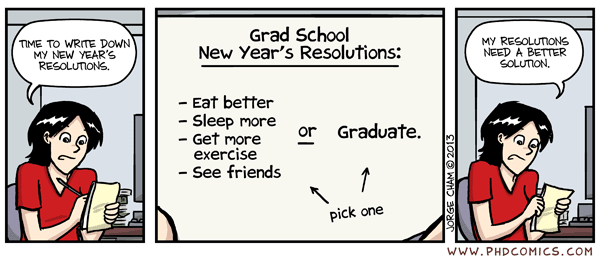 |
||
|
title:
"Grad School New Year Resolutions" - originally published
1/3/2014
For the latest news in PHD Comics, CLICK HERE! |
||
The Love of God Made Visible: Francis J. Moloney and Dorothy Lee teach eConference on the Gospel of John
I have now discovered that Frank is at it again, as he joined another excellent Johannine scholar in Dorothy Lee in teaching an e-conference on the Gospel of John.
| Frank Moloney and I in my study. |
Enjoy!
12/02/13 PHD comic: 'Your Academic Forecast'
| Piled Higher & Deeper by Jorge Cham |
www.phdcomics.com
|
|
 |
||
|
title:
"Your Academic Forecast" - originally published
12/2/2013
For the latest news in PHD Comics, CLICK HERE! |
||
11/22/13 PHD comic: 'What to do when you're overwhelmed, Part 2'
| Piled Higher & Deeper by Jorge Cham |
www.phdcomics.com
|
|
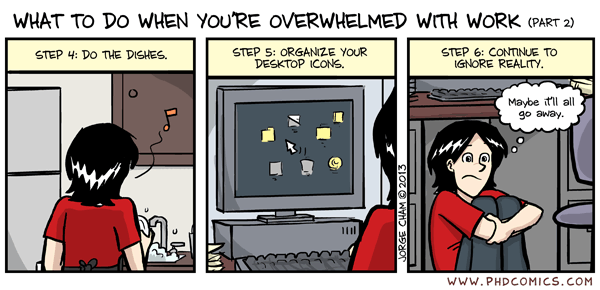 |
||
|
title:
"What to do when you're overwhelmed, Part 2" - originally published
11/22/2013
For the latest news in PHD Comics, CLICK HERE! |
||
